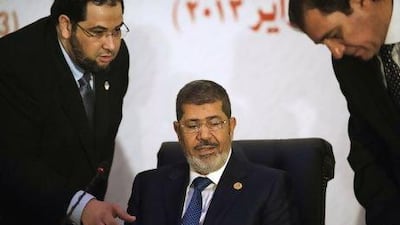CAIRO // Syria's fragmented opposition groups must unify if they are to bring about democracy, Egypt's president Mohammed Morsi yesterday told a summit of leaders from Islamic states.
The Syrian civil war was a central issue on the first day of the meeting of the Organisation of Islamic Cooperation (OIC) in Cairo, with Mr Morsi warning that rebel factions should align with the National Coalition, which is recognised by the international community.
They should "coordinate with this coalition and support their efforts for a unified approach", he said.
"The Syrian regime must draw lessons from history: it is the people who remain," added Mr Morsi. "Those who put their personal interests above the interests of their people will end up leaving."
The meeting gathers the leaders of 26 of the OIC's 57 states, and the focus on Syria added to the tension surrounding the historic visit of Mahmoud Ahmadinejad to Cairo, the first visit by an Iranian leader to the country since the 1979 Islamic revolution in Iran.
The gathering was expected to issue a resolution calling for "serious dialogue" between the opposition and the president, Bashar Al Assad, and declaring the "main responsibility for the continued violence falls on the Syrian government", according to a leaked document.
The Iranian leader yesterday found himself the lone advocate of the Syrian regime at the summit.
Iran is eager to show the world that Egypt's democratic transition was related to its own 1979 revolution, and to restore ties across the Arab world as it becomes increasingly isolated internationally.
Its support for Mr Al Assad's government in Syria has only added to its troubles in a region that has roundly sided with the rebels fighting to unseat him.
Mr Ahmadinejad yesterday accused unnamed outside forces of trying to prevent Egypt and Iran fromreaching a full-fledged rapprochement.
Iran severed ties with Egypt during the time of Anwar Sadat because Cairo gave refuge to the deposed shah. Sadat's peace treaty with Israel only increased the animosity between the countries.
The Iranian president called for a strategic alliance but said "there are those striving to prevent these two great countries from coming together, despite the fact that the region's problems require this meeting, especially the Palestinian question". He also said Iran had offered a loan to help Egypt prevent its economic situation from worsening.
But Egyptian officials have doused speculation about deepening ties with Iran.
The foreign minister, Mohamed Kamel Amr, described the red-carpet treatment for Mr Ahmadinejad as a "normal procedure".
There were other signs that Mr Ahmadinejad's visit was not yielding a warm response.
In a meeting on Tuesday afternoon with Ahmed El Tayyeb, the grand imam of Al Azhar, Mr Ahmadinejad was denounced for the "spread of Shiism in Sunni lands", told to "respect Bahrain as a brotherly Arab nation, and not interfere in the affairs of Gulf states", according to a statement from Mr El Tayyeb after the meeting.
In recent months, Egyptian imams have lashed out against the spread of Shiism in increasingly sectarian tones.
Egypt's leading religious authorities, who espouse Sunni doctrine, have accused Shiites of threatening the unity of Islam.
Ali Gomaa, the Grand Mufti, warned in a sermon at Al Azhar University in October that Shiites should not spread their beliefs in the country.
He warned that "sewing the seeds of Shiism in a non-fertile soil like Egypt will lead to nothing but instability and discord".
Soon after the meeting at Al Azhar, a bearded man attempted to throw his shoe at Mr Ahmadinejad as he left the Hussein mosque, across the street from Al Rifa'i mosque, where Iran's former shah is entombed.
Mr Morsi's high-profile meetings with foreign dignitaries come as he struggles with turmoil in his country. More than 60 people have died since January 25 in clashes with police over his performance as president and a controversial court verdict sentencing 21 men to death for their role in a deadly football riot in Port Said last year.
twitter: For breaking news from the Gulf, the Middle East and around the globe follow The National World. Follow us

